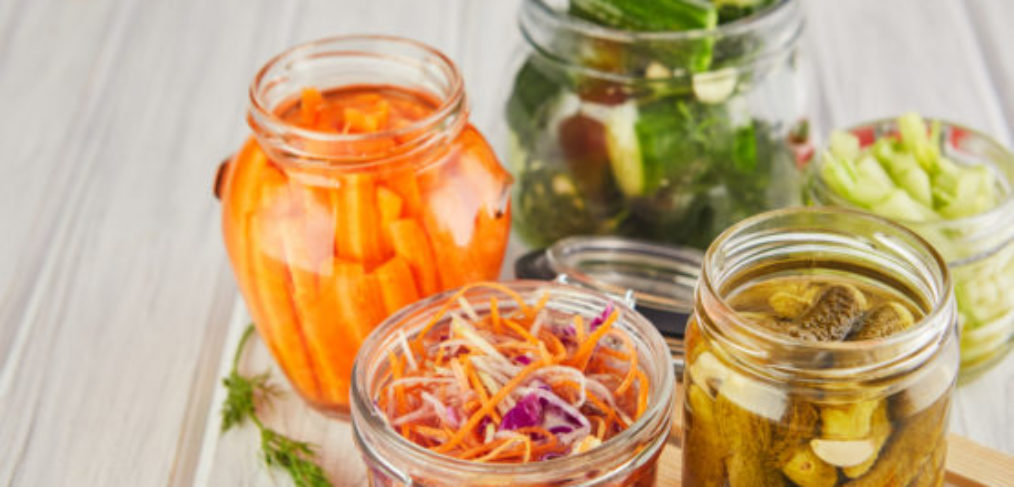Fermented Food for Everyone?

Kim chi. Kombucha. Sauerkraut. Kefir. Yogurt. Cheese?
Sound delicious?
All of the above are not only tasty ways to jazz up your meal and add a robust flavor, they’re also a great way to get a gut health boost, by introducing a means of altering the trillions of bacteria, virus and fungi that make up what is collectively known as the gut microbiome. (1)
They may also lead to lower levels of body-wide inflammation, which scientists increasingly link to a range of diseases tied to aging.
A recent study at Stanford University (2) wanted to see what impact fermented foods might have on the gut and immune system, and how it might compare to eating a relatively healthy diet.
After 2.5 months, the fermented food group showed marked reductions in 19 inflammatory compounds. Among the compounds that showed declines was interleukin-6, an inflammatory protein that tends to be elevated in diseases such as Type 2 diabetes and rheumatoid arthritis. The high-fiber group, in contrast, did not show an overall decrease in the same inflammatory compounds.
Gut microbiome diversity is a good thing; lower rates of obesity, Type 2 diabetes, metabolic disease and autoimmune conditions are all associated with improving gut health.
In the US ad other industrialized nations, society as a whole tends to have less microbial diversity in their guts than those living in more traditional, non-industrialized societies (3).
Modern lifestyle factors like diets high in processed foods, chronic stress and physical inactivity may suppress the growth of potentially beneficial gut microbes.
So should we all pile on the kim chi and keep the kombucha flowing?
Not necessarily.
People with gut health issues, particularly Candida overgrowth or SIBO may need to tread lightly here.
Kombucha, a popular fermented food, uses a SCOBY (symbiotic colony of bacteria and yeast). Not only are good bacteria or probiotics present, bad bacteria and yeast are also present during the fermentation process.
All of the prebiotics produced during that process also feed bad bacteria and yeast.
This means that fermented foods themselves may be high in bad bacteria and yeast (4).
In addition, the high concentration of prebiotics found in fermented foods also makes its way to your gut. There, it feeds good bacteria, bad bacteria, and yeast alike (5).
So if you are dealing with SIBO or Candida overgrowth, and already have an overpopulation of bad bacteria or yeast, eating fermented foods adds fuel to the fire.
This means that while it’s true that fermented foods do have potential health benefits, they may actually cause more harm than good by perpetuating gut infections!
However, that doesn’t mean you’ll never be able to enjoy these tasty foods again, just that you’ll be able to incorporate them in without consequence after your gut has healed.
Once your remarkable body (yes, our bodies are just that) has healed, choose your probiotics wisely.
- For kombucha, stick with the lowest sugar options you can find. Some are so high in sugars from fruit juice, they may contain over 20g/ 8 oz serving!
- For kim-chi, be sure to stick with a version that is not spicy if you’re following an Auto Immune Protocol. Nightshade plants, which are to be avoided in this case, include all peppers, so you’ll be better of with what may be called a mild version.
- Yogurt + cheese? Stick with plain, no sugar or fruit added, full fat and raw. Tasty Tip: blend raw butter into your bone broth for a delicious way to increase the satiety you’ll experience.
Undoubtedly, fermented foods can have a permanent role in an eating approach geared to achieving, then maintaining, a healthy gut.
Pass the kim chi, please!
- https://www.nytimes.com/2021/08/13/well/eat/yogurt-kimchi-kombucha-microbiome.html
- https://www.cell.com/cell/fulltext/S0092-8674(21)00754-6?_returnURL=https%3A%2F%2Flinkinghub.elsevier.com%2Fretrieve%2Fpii%2FS0092867421007546%3Fshowall%3Dtrue
- https://science.sciencemag.org/content/366/6464/eaaw9255.full?fbclid=IwAR0DvS49mvcZGz28cZYjI9j2WeErNmXyD5dfHIWhvg7e9tdy3rXDuUjmPgU
- https://www.amymyersmd.com/article/fermented-foods/
- https://www.ift.org/news-and-publications/food-technology-magazine/issues/2016/december/columns/inside-academia-fermentation-science-washington-state-university-university-of-idaho





